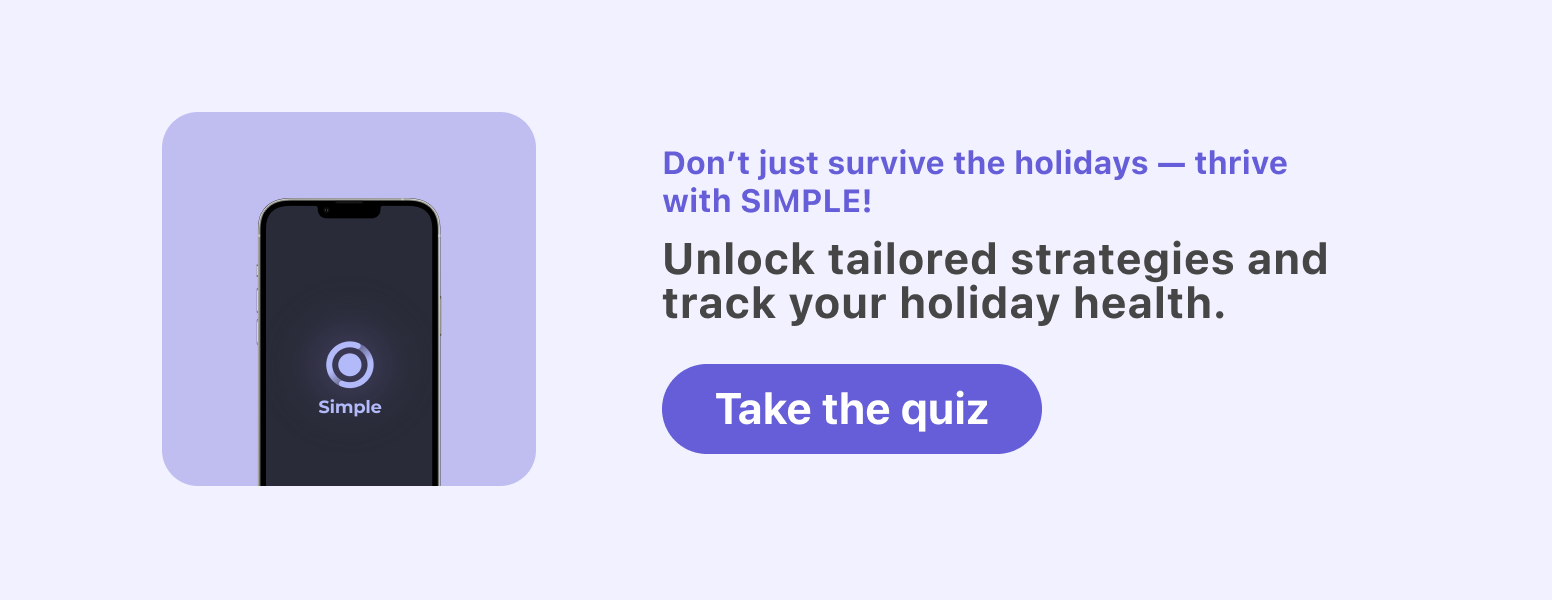Healthy lifestyle tips for the holidays

Do you worry about your weight during holidays and vacations? If so, you’re not alone.
Celebrations, trips, time with family and friends — and, of course, big holiday or vacation meals — all of these can be great fun and add richness to our lives.

Yet health-conscious people, or people on longer-term weight loss journeys, sometimes worry about whether these events might derail them.
Good news: With some small hacks, a bit of preparation, and proactive thinking, you’ll sail through all the festivities with your health and weight loss project intact!
Don’t just survive the holidays — thrive with Simple! Unlock tailored strategies and track your holiday health. Curious? Dive into our Simple quiz today.
Your mindset for a healthy holiday lifestyle
Focus on mindful enjoyment.
Whatever it is you love about your holidays, celebrations, vacations, and so on … slow down to appreciate it.
Use all your senses to get present and really marinate in that experience.
Focus on aspects like …
- the smell of someone’s cooking;
- the warm hug that your beloved relative gives you;
- the silly laugh your goofy uncle has as he tells jokes around the table that always makes you smile; and, of course,
- the flavors of your favorite holiday dish.
Try to savor, rather than rush through, each element.
Don’t use anxiety or bargaining as a tool.
It might seem like worrying about the holiday might be useful, but it tends to backfire. Same with “saving up calories.”
When you’re not adapted to a short eating window and miss your usual meals, your blood sugar dips down, and your cortisol levels increase, which means you’ll feel more stressed and tired — hello, cranky party guest!
You’ll also be super hungry when you show up to that holiday dinner, and you’ll be more likely to eat more than your body needs or wants.
Instead …
Think strategically.
Step back and think ahead. What can you reasonably anticipate over the holiday time? For instance:
- The weather over the winter holidays might make driving treacherous and stressful. By the time we get there, I’ll be starving and grumpy.
- My family member might say [insensitive thing X], and that’ll make me want to eat.
- They’re going to have a cheese fountain. Good heavens, I’m only human!!
And, for each of those scenarios, what are one or two possible tactics you know can help you?
Important: Be realistic. Imagine only solutions or strategies that you know you’ll actually use and do.
For instance, “I’ll sit across the room from the cheese fountain” might be more realistic than “I’ll never touch cheese again!”
OK, you’ve got your head right. Now, let’s get down to what to do.

Healthy holiday lifestyle hacks — what to do to make it work
Have a snack before heading to a food event.
Don’t show up ravenous. Instead, try having a small, nutrient-dense snack beforehand.
Look for options that have plenty of protein and fiber to help you feel satisfied (and much calmer when you roll into that event). Fruit or vegetable platters with protein-rich dips such as hummus and crackers make great choices!
Practice slowing down.
Holidays and vacations can be a whirlwind of travel, chores, family obligations, yelling at your kids to stop ruining the group photo (then feeling bad about it), and so on. It can be easy to rush, rush, rush … right into the candy dish.
So try this instead:
- As much as possible, practice slowing down. This gives your wise brain a few extra moments to catch up and get into the driver’s seat.
- Before a meal, pause. Take one breath. Notice where you are and what’s happening.
- Between bites, pause. Take another breath. Maybe a sip of water.
Just keep pausing and noticing as often as you can. You’ll be amazed at how much this helps.
Practice checking in to your physical cues.
Start now — get into the habit of regularly “sensing in” to your body and see if you can identify whether you’re physically hungry or satisfied.
The more you practice this on normal days, the better you’ll be able to do it under “game day conditions” when there are more distractions and pressures.
Try using a mental hunger / fullness scale.
- 1 is absolutely starving, and you’d eat tree bark to survive.
- 10 is so over-stuffed that all you can do is lie there and moan.
Ideally, you want to start eating when you’re around a 3 (hungry, but not freaking out) and stop eating when you’re around a 7 (just satisfied but not “full”).
Practice mindful eating.

Mindful eating helps us enjoy and appreciate the experience of eating without rushing or feeling like we “checked out.”
This is especially important at social gatherings, where distractions, sensory overload, and other people can influence us to eat more than we’d comfortably want.[1]
To combat this, try taking one “mindful bite” at every meal or snack during the holidays to help you slow down and enjoy your food.
A mindful bite uses all your senses: Pay attention to the food’s appearance, give it a smell, pick it up, and see what texture it has. Then, take a bite and notice how the texture changes as you chew it.
This small exercise keeps you present when you start eating and can serve as a reminder to pay attention to portions.
Practice using physical cues to remind yourself.
You can also use physical cues to get off autopilot and help yourself stay present during meals.
For instance, “When I finish dinner, I’ll put my napkin on my plate.”
Physical actions can be discreet yet powerful reminders to pay attention to your hunger cues when eating with others.
Practice being intentional with meal times.
Holidays and vacations often give us extra time to relax. This might mean we loosen up our normal food habits, which can be a nice break from a routine and an opportunity to enjoy more flexibility.
But just like people with extra-loose joints have found, with great flexibility comes great responsibility. As you enjoy a meal of whatever you want, whenever you want, wherever you want (for instance, sitting in bed), remember to be intentional about the “what you want” part.
Choose deliberately and with purpose.
Pause and ask yourself, “What do I truly want right now? Why? What will I truly enjoy about this experience? How does this align with who I am and what I value?”
There are no right or wrong answers. The goal is just to pay attention and choose with awareness.
You might find that having a little bit of structure is helpful — for example, “I’ll eat whatever I feel like eating, but I’ll only eat that when I’m sitting at the table.”
Practice your healthy nutrition habits as well as you can.
Did you eat a handful of shortbread cookies for breakfast? No big deal. Make sure you get some vegetables for lunch. And drink a glass of water.
Is that holiday dinner a 6-course spread? OK, you got this. Grab an extra spoonful of salad for your veggies, at least. Oh yeah, and have another glass of water.
In other words, whatever you can do, do it.
Look for ways to add nutrition and other healthy habits wherever and however you can.
Practice staying active.

Holidays and vacations can give us time to rest, but they don’t mean we should be inactive.
Physical activity can help you beat stress, maintain your fitness level, keep you on the weight loss journey, and help you socialize.
Try to get your heart pumping for at least 15 minutes three to four days per week, even during the holidays. Ask your cousin to hit the gym with you, grab a buddy to play some tennis, or go on a brisk walk around the neighborhood!
Practice intermittent fasting.
There’s no time like the holidays to jump into intermittent fasting! Unlike many fad diets, intermittent fasting promotes weight loss, among many other benefits.
An approach like the 16:8 method can be ideal during the holiday season; it gives you plenty of time to enjoy those holiday meals while helping you avoid eating all day to the point of being uncomfortably overfull.
As with any lifestyle choice, balance is essential. But intermittent fasting may be one of the best practices you use over the holidays to help keep your weight in check.
If you’re new to intermittent fasting, check out our guide to intermittent fasting for beginners and see which of the methods we share might suit you best. If you need a little more help deciding your best approach, try our Simple quiz.
Yes, it’s possible to strike a balance between enjoying special occasions and maintaining a healthy eating plan.
When you slow down to make mindful choices, stay active, and prioritize taking care of yourself, you can savor the festivities without derailing your goals. Some weight gain may also be fluid-related, meaning the moment you return to your usual routine, it should melt away.
Absolutely. You don’t have to deprive yourself.
However, instead of just going on “autopilot,” deliberately choose the foods and drinks you’re going to enjoy mindfully. Slow down and savor them — along with the good times and company!
Remember that consistency over time is more important than occasional indulgences.
Communicate your goals with friends and family beforehand. They may be more understanding and supportive of your choices. Also, focus on engaging in conversations and activities rather than just eating.
If you’ve had enough or are offered something that’s not part of your plan, simply decline politely. “It looks delicious, but I’ve had enough,” or “That’s very generous, but I’m fine for now” is sufficient.
It’s also helpful to bring a healthier dish to share, ensuring there’s an option you can enjoy.
You can enjoy alcohol in moderation, but be mindful of its calorie content and potential effects on your choices. Opt for lower-calorie options where possible.
Eat and drink mindfully!
And stay hydrated, especially if you’re somewhere warm! For every alcoholic drink, have at least one glass of water.From festive feasts to daily dishes — Simple’s got you! Enjoy recipes; track your hydration, exercise, and food; and stay motivated. Kickstart your healthier holidays with our Simple quiz.

